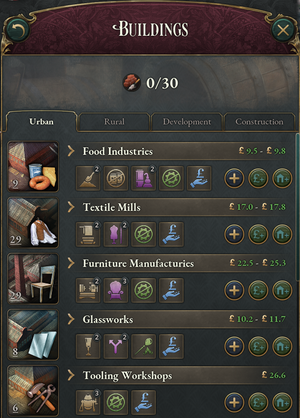Buildings are a place where pops work to produce resources such as goods.
Buildings generally do not represent a single building, but rather a wide range of industries, businesses and government functions, ranging from humble subsistence farms to complex motor industries and sprawling financial districts. For example, a single level of government administration represents the necessary buildings and infrastructure to support a certain number of bureaucrats.
Buildings always need qualified pops to work in them to yield any benefit, and an empty building is just that -- empty and completely useless. This holds true even for buildings like railroads and ports.
Construction
Buildings are located and built on the state level. Most buildings are directly constructed, but some (like subsistence buildings) will appear automatically based on certain conditions. When buildings are constructed, the construction uses pop labor and goods, and the costs involved will be subject to market forces.
While technically there is no limit on the number of buildings that can be built inside a state, different limitations put on the buildings themselves (which are meant to simulate a sensible and realistic way for them to function) limit the states the player can place them in. For example, many production buildings are limited by locally available resources, such as arable land for agriculture or iron abundance in the case of iron mines. In a similar fashion, urban buildings (such as factories) are only limited by how many people can be crammed into the state, simulating the more densely populated nature of cities.
建筑类别
一般来说,建筑可以分为以下几类:
- 自给建筑 - 自给建筑是一种特殊的低效率建筑,不能被手动建造或者摧毁,但是会在世界上任何未使用的可耕土地存在。游戏开始时,世界上的绝大多数人口都以
 自给农的职业在自给建筑工作。私人所有制下,自给建筑还会提供
自给农的职业在自给建筑工作。私人所有制下,自给建筑还会提供 教士和
教士和 贵族的岗位。在自给建筑中工作的人口对GDP和税收贡献甚微,游戏进行工业化的过程中,会为自给农提供更有生产力的就业机会。
贵族的岗位。在自给建筑中工作的人口对GDP和税收贡献甚微,游戏进行工业化的过程中,会为自给农提供更有生产力的就业机会。
- 城镇中心 - 另一种特殊建筑,类似自给建筑,这些建筑是自动创建而非手动建造的。一个地区的城镇中心等级与其本地建筑产生的城镇化程度相关,每有100城镇化就会创建一级城镇中心。城镇中心主要提供
 店主和
店主和 教士岗位,并生产
教士岗位,并生产 服务。
服务。
- 私有建筑 - 绝大多数建筑都属于私有建筑,包括广泛的行业,例如农场、种植园、矿山和工厂。与政府建筑不同的是,私有建筑不是由国家所有,而是由
 资本家和
资本家和 贵族所有。所有者获得私有建筑的利润并为员工支付工资。需要注意的是,在不同所有制下,私有建筑的所有权可能完全不同。
贵族所有。所有者获得私有建筑的利润并为员工支付工资。需要注意的是,在不同所有制下,私有建筑的所有权可能完全不同。
- 开发建筑 - 开发建筑往往是政府建筑,但并非总是如此。开发建筑提供特殊的地区功能,比如,从当地居民中招募和训练士兵的兵营或为其他建筑物提供将商品推向市场所需的基础设施的铁路。
Managing buildings
To ease the management of all the different buildings (and their associated production methods) in the country the player can refer to the buildings panel.
The panel provides a birds-eye view of all industries in the country and see at a glance how they're doing financially. The buildings are organized by major and minor type and can be broken down further to view the individual building in each state with the possibility of clicking on one to get an in-depth view of its balance sheet and workforce. In addition, the panel allows adjusting the production methods of an individual building or set all production methods for a certain building type to a specific setting all across the country.
Predictive tooltips will explain the anticipated impact on the building's balance as a result of changes in production, consumption, and wage requirements, as well as the changes in employment (which new job positions will be created and which will disappear) that could also impact the country's politics over time. A warning will be provided if there aren't enough qualifying pops to take on any new professions created, as this could limit the industry's effectiveness.
